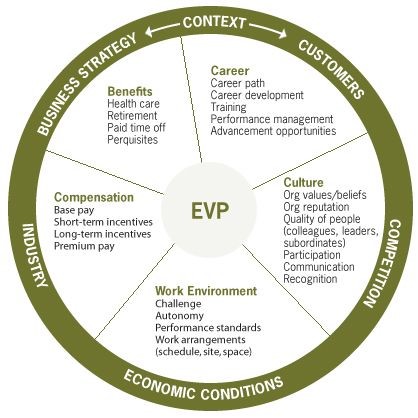 Employee Value Proposition (EVP)
Employee Value Proposition (EVP)
What is an Employee Value Proposition (EVP)? In short, an EVP encompasses everything an employer is doing to attract and retain employees. It includes all of the pay, benefits, rewards, and perks that come with being an employee of that organization. Basically, it’s the reason why an employee would want to work there as opposed to finding employment somewhere else.
An EVP is the unique value that the company brings to employees. The EVP is what sets a company apart from the competition for talent and will help the employer attract and retain the talent they need to prosper and be productive. Having an effective EVP can help to attract new employees that have goals and values that are in alignment with companies goals and values, which aids in employee retention.
To ensure an EVP generates maximum returns, it must be built around attributes that genuinely attract, engage and retain the talent you want. It must also be consistent with strategic objectives and clearly demonstrate its uniqueness.
The EVP must also be real i.e. a large proportion of it must be true now. It should, however, also contain elements that are not true now but that the organisation aspires to. This is important to drive change and progress, and also to give employees a sense that the organisation is responding to the changes they want to see.
As well as the ‘content’ of the EVP, it must also be articulated in a style that appeals to the audience. So many companies write about themselves in dull corporate speak and the net result is a lot of organisations that claim to be unique but sound the same.
Finally, as shown in the diagram, the EVP is at the core of all other organisational processes. The characteristics of the EVP need to be reflected in the corporate and employer brands. The EVP, if structured well, is the driver of engagement, it informs recruitment messages and communications, and it helps inform strategic HR priorities. It helps support and drive business strategy forward.
